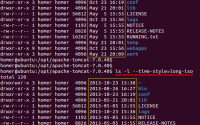本文是Linux Shell脚本系列教程的第(二)篇,更多shell教程请看:Linux Shell脚本系列教程 通过上一篇教程的学习,相信大家已经能够对shell建立起一个大体的印象了,接下来,我们通过一个最简单的脚本来继续深入对shell的学习。 新建shell脚本 新建一个文件,扩展名为sh(sh代表shell),或者其他任意名字,其实扩展名并不影响脚本执行,见名知意就好,这里用sh是为了便于分辨。 在你新建的文件中输入以下内容: #!/bin/bash echo…
Linux Shell脚本入门教程系列之(九)Shell判断 if else 用法
本文是Linux Shell脚本系列教程的第(九)篇,更多shell教程请看:Linux Shell脚本系列教程
判断语句是每个语言都必不可少的关键语法,Shell命令当然也不例外。继上一篇之后,今天就给大家介绍下Shell判断语句 if else 用法。
if 语句通过关系运算符判断表达式的真假来决定执行哪个分支。
Shell 有三种 if else格式:
- if … fi 格式
- if … else … fi 格式
- if … elif … else … fi 格式
下面我就分别就这几种格式来为大家详细介绍下。
一、Shell判断语法之if … else 格式
if … else 格式的语法:
if [ expression ] then Statement(s) to be executed if expression is true fi
说明:
如果 expression 返回 true,then 后边的语句将会被执行;
如果返回 false,不会执行任何语句。
最后必须以 fi 来结尾闭合 if,fi 就是 if 倒过来拼写,后面也会遇见。
注意:expression 和方括号([ ])之间必须有空格,否则会有语法错误。
使用举例:
#!/bin/sh a=400 b=800 if [ $a == $b ] then echo "a is equal to b" fi if [ $a != $b ] then echo "a is not equal to b" fi
运行结果:
a is not equal to b
二、Shell判断语法之 if … else … fi 格式
if … else … fi 语句的语法
if [ expression ] then Statement(s) to be executed if expression is true else Statement(s) to be executed if expression is not true fi
说明:
如果 expression 返回 true,那么 then 后边的语句将会被执行;
否则的话,将会执行 else 后边的语句。
使用举例:
#!/bin/sh a=400 b=800 if [ $a == $b ] then echo "a is equal to b" else echo "a is not equal to b" fi
执行结果:
a is not equal to b
三、Shell判断语法之if … elif … fi格式
if … elif … fi 语句可以对多个条件进行判断
语法:
if [ expression 1 ] then Statement(s) to be executed if expression 1 is true elif [ expression 2 ] then Statement(s) to be executed if expression 2 is true elif [ expression 3 ] then Statement(s) to be executed if expression 3 is true else Statement(s) to be executed if no expression is true fi
说明:
哪一个 expression 的值为 true,就执行哪个 expression 后面的语句;
如果都为 false,那么不执行任何语句。
使用举例:
#!/bin/sh a=400 b=800 if [ $a == $b ] then echo "a is equal to b" elif [ $a -gt $b ] then echo "a is greater than b" elif [ $a -lt $b ] then echo "a is less than b" else echo "None of the condition met" fi
运行结果:
a is less than b
四、其他说明
if … else 语句也可以写成一行,以命令的方式来运行,像这样:
if test $[2*3] -eq $[1+5]; then echo 'The two numbers are equal!'; fi;
if … else 语句也经常与 test 命令结合使用,如下所示:
num1=$[2*3]
num2=$[1+5]
if test $[num1] -eq $[num2]
then
echo 'The two numbers are equal!'
else
echo 'The two numbers are not equal!'
fi
输出:
The two numbers are equal!
test 命令用于检查某个条件是否成立,与方括号([ ])类似。
好了,今天对于Shell判断(Shell if else)用法就先为大家介绍到这里,还是那句话,大家要多多练习才是。
更多shell教程请看:Linux Shell脚本系列教程
原文:Linux Shell系列教程之(九)Shell判断 if else 用法
本文:Linux Shell脚本入门教程系列之(九)Shell判断 if else 用法
![]()





